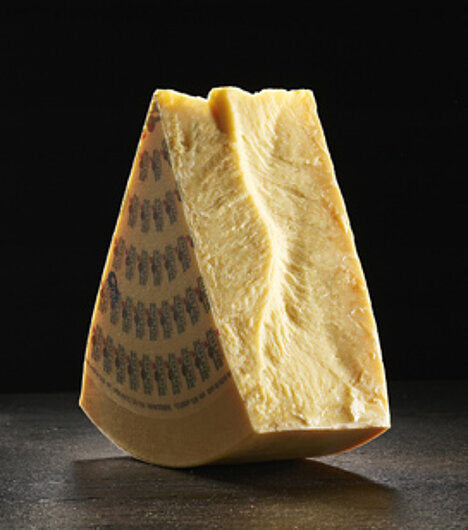Sbrinz

Sbrinz is a traditional Swiss hard cheese made from raw cow's milk. It has a tangy, intense flavor and a crumbly, crystalline consistency. It is ideal for grating, slicing or mincing and can be used as an ingredient or snack. But is Sbrinz also suitable for dogs? In this article, you'll find out everything you need to know about Sbrinz in relation to dogs.
What is Sbrinz?
Sbrinz is one of the oldest types of cheese in Europe and originates from Central Switzerland. It is mainly produced by hand in copper vats in the cantons of Lucerne, Obwalden and Nidwalden using traditional methods. It consists only of raw milk, rennet, cultures and salt and contains no other ingredients or additives. It is aged for at least 16 months before it is sold, but it tastes best when it is at least two to three years old. Its salt content is 12 to 16 g/kg, which is relatively high compared to other cheeses.
The name Sbrinz is probably of Romance origin and can be linked to the Romanian word brânză or the Dalmatian brenza (a type of sheep's cheese). Another theory is that the name is derived from the village of Brienz, which was the main transshipment point for Sbrinz in the Middle Ages. Sbrinz is pronounced in two syllables in Swiss German: Schbri-enz. The names Sbrinz and Alp-Sbrinz are protected designations of origin and therefore carry the addition AOC (Appellation d'Origine Contrôlée).
What are the benefits of Sbrinz for dogs?
Sbrinz can have several benefits for dogs if it is fed in moderation. Firstly, Sbrinz is a good source of protein, calcium and phosphorus, which are important for muscle development, bone health and dental hygiene in dogs. On the other hand, Sbrinz can also have positive effects on dogs' digestion, as it contains probiotics that can promote the growth of good bacteria in the intestines. Sbrinz can also serve as a reward or motivation for dogs that like cheese.
What are the disadvantages of Sbrinz for dogs?
Sbrinz can also have some disadvantages for dogs if it is fed too often or too much. Firstly, Sbrinz is very salty, which can lead to increased thirst and increased water intake. This in turn can overload the kidneys or lead to an imbalance in the electrolyte balance. Sbrinz is also very high in fat, which can lead to obesity, abdominal pain or diarrhea. Sbrinz can also trigger allergies or intolerances if dogs are sensitive to dairy products. This can manifest itself in symptoms such as itching, skin rashes or vomiting.
How much Sbrinz can a dog eat?
There is no general rule as to how much Sbrinz a dog can eat, as this depends on various factors such as the dog's age, weight, state of health and activity level. However, as a rule of thumb, Sbrinz is only suitable as an occasional treat and not as a staple food for dogs. A possible guideline is that Sbrinz should not make up more than 10% of a dog's daily calorie intake. This means that a dog that needs 500 calories a day, for example, should not get more than 50 calories from Sbrinz. This corresponds to about 10 to 15 grams of Sbrinz, depending on the fat content.
How should Sbrinz be prepared for dogs?
Sbrinz for dogs should always be prepared fresh and in small quantities. It should not be mixed or seasoned with other foods, as this could affect the dog's digestion or taste. It should also not be heated or cooked, as this could alter the nutrients or the consistency of the cheese. It is best to break or shred Sbrinz into small pieces and give it directly to the dog or sprinkle it over its food. Care should always be taken to ensure that the dog has enough water available to quench its thirst.
Sbrinz is a delicious and nutritious cheese that can also be suitable for dogs if fed in moderation. It can have some health benefits for dogs, such as providing protein, calcium and probiotics. However, it can also have some disadvantages, such as increasing the salt and fat content in the body. Sbrinz should therefore only be used as an occasional snack and not as a main food for dogs. It should also always be prepared fresh and in small quantities to avoid possible digestive problems or allergies.
If you notice any signs of hypersensitivity or poisoning in your dog, you should see your vet immediately. We are not a substitute for a vet, but we try to be as accurate as possible. Every dog reacts differently and we recommend you get a second opinion or consult your vet if in doubt.
Stay healthy and take good care of your four-legged friend!😊